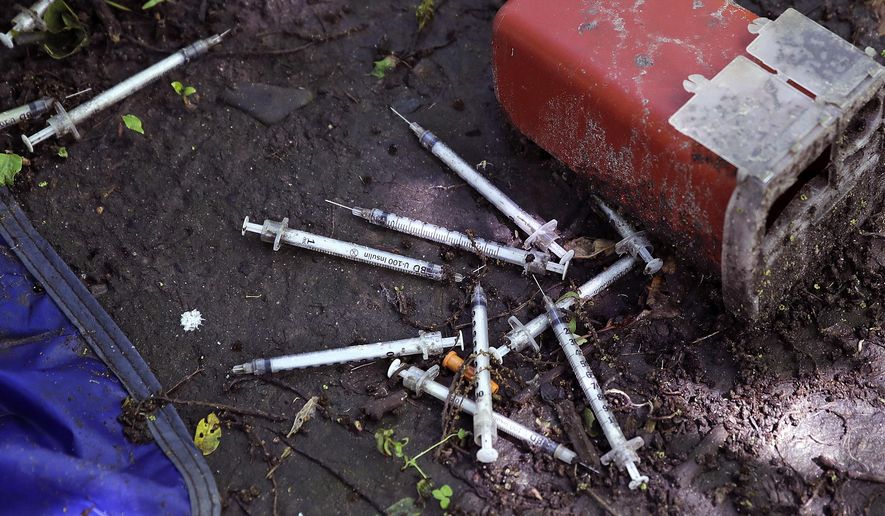Virginia’s health and human services secretary says America’s drug woes extend beyond opioids into a vast, complex problem that claimed an estimated 64,000 lives across the country last year.
“If it’s too narrowly cast as opioids, we’re missing a lot of the picture,” Health Secretary William A. Hazel told The Washington Times. “Our problem is one of addiction.”
This week, President Trump suggested to reporters that he could be moving toward declaring a national emergency in response to the opioid epidemic.
Virginia and Maryland are two of a handful of states that have declared emergencies in the epidemic, counting 1,133 and 918 overdose deaths in 2016, respectively.
The declarations allowed Virginia and Maryland to free up funds for initiatives to curb the epidemic and coordinate efforts among law enforcement, medical first responders and health agencies to implement a multipronged strategy.
Virginia also has provided physicians with information about best prescribing practices and opiate alternatives, and set up a website to connect addicts to the nearest treatment facility.
Maryland, meanwhile, has allocated $50 million over five years to combat the epidemic. In July, the state government announced that an extra $12 million — $10 million from the federal 21st Century Cures Act and $2.1 million from Governor’s Office of Crime Control and Prevention — would supplement annual funds to prevention, enforcement and treatment efforts.
Mr. Hazel said that if a national emergency is declared, he would like to see one specific federal regulation reworked, specifically *CFR 42 part two, which stymies efforts to access prescribing rates in methadone clinics in Virginia.
“We need this reporting from methadone clinics to the prescription drug monitoring program so we can effectively identify when there is doctor shopping or when there’s bad prescribing or dangerous prescribing practices,” he said.
Comparing prescriptions in methadone clinics with the pharmacies will better help Virginia officials make sure people aren’t “doctor shopping” for prescriptions and abusing the system, Mr. Hazel said.
“We need to get the same information from methadone clinics that we get from pharmacies,” he said.
The components of a national declaration of a state of emergency are not fully known.
In August the President’s Commission on Combating Drug Addiction and the Opioid Crisis recommended a national declaration under either the Public Health Act or the Stafford Act, which make resources available from the Department of Heath and Human Services and the Federal Emergency Management Agency, respectively.
Currently, both agencies are heavily engaged in responding to at least four major crises — wildfires in California and hurricanes in Texas, Florida, the U.S. Virgin Islands and Puerto Rico — in addition to their regional offices dealing with smaller-scale emergencies.
Last week, the House approved $36.5 billion for FEMA that needs to be approved by the Senate. That appropriation is in addition to $15.25 billion approved in September.
Historically, public health crises have received a more tempered monetary response from Congress. Stat News reported that Congress has lessened the amount of funds made to such health crisis over the years — such as influenza H1N1 in 2009 ($7.7 billion), Ebola in 2014 ($5.4 billion) and Zika last year ($1.1 billion).
According to the Health and Human Services website, if the president authorizes a public health emergency declaration, it will last 90 days and may be extended as necessary.
The HHS lists 13 actions that can be implemented, including making more funds available for state governments to supplement action plans already in place and waiving certain administrative requirements to qualify for such funds.
An HHS spokeswoman said that any response from the department with regard to a national emergency is being evaluated by White House staff.
“The president’s policy advisers are working through the details with all of the relevant components and agencies. Right now these actions are undergoing a legal review,” the spokeswoman said.
Mr. Hazel said that the different layers of the opioid epidemic — from the prescribing practices of physicians to the actions of criminal drug dealers — make it a more complicated situation than a normal health crisis.
“It’s a very, very different type of situation that I think we’ve ever dealt with before,” he said.
(* Correction: An earlier version of this article didn’t state which precise federal regulation Virginia Health and Human Services Secretary William A. Hazel would like to see repealed. That regulation is CFR 42 part two and is indicated above.)
• Laura Kelly can be reached at lkelly@washingtontimes.com.




Please read our comment policy before commenting.